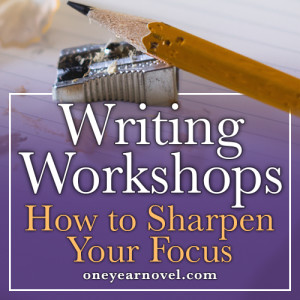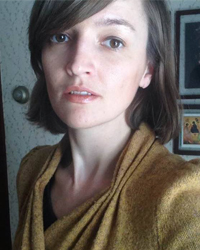Writing Workshops: How to Sharpen Your Focus
By Tineke Bryson, Staff Writer
 What are writing workshops supposed to do for us? Whatever it is, how do we make sure it happens? Can we leap into more than one pool of opportunity?
What are writing workshops supposed to do for us? Whatever it is, how do we make sure it happens? Can we leap into more than one pool of opportunity?
Figuring out how to approach a writing workshop reminds me of standing in The Wood Between the Worlds, in Lewis’s The Magician’s Nephew. But whereas Polly and Digory are full of peaceful wonder as they consider the many pools in the wood, each of which might take them to a different world, I don’t feel very peaceful. Preparing the heart for a writing workshop can be overwhelming. One pool could lead to meeting that author who might connect us to their agent. Another pool could bring us rich friendships with other writers. Yet another pool might offer breakthrough writing insights.
The amount of money we are spending—or receiving from someone—makes these choices weigh even more on our minds. We want the investment to be justified.
The One Year Adventure Novel Summer Workshop is just a few weeks out. As the coordinator, and as a fellow writer who has attended writing workshops before, I want you to have a fantastic time—all of us on the OYAN team do. How can you prepare your heart and mind for your week with us?
You need mental and emotional preparation as much as you need to write excerpts and pack.
Carve out a slice of “thought” time before you start packing.
The most important thing you can do to alleviate your “choice anxiety” in the weeks ahead is to take some time for thought. Perhaps you fear you’re overthinking, but reflection is distinct from overthinking.
You will have a richer and more focused experience at the workshop if you pause beforehand to reflect. It will also help you “come down” off the pitch of emotions on the other side of your week with us.
Many people count on a workshop to offer them time for reflection. Time away. A whole new scene, breathing new air. Some workshops are structured like a retreat; our Summer Workshop isn’t. You will be busy all day, and I think you will find that you are usually too excited to use your free time for something calm like journaling or taking a walk.
Think of the Summer Workshop as a super fun, very full week. Let that expectation set.
Then carve out some “thought time” beforehand.
I recommend thirty minutes. That’s it. I personally find I have to do something to ease my mind into thoughtfulness. Choose a day and time to go for a walk by yourself, or sit down to journal for a bit. Plan a solitary drive into the countryside (if you are licensed to drive!).
Listen to Yourself.
How you are feeling?
Ask yourself.
Stressed about what I need to do, obviously, you might think. Or So excited I can barely concentrate!
Those easy answers are doubtless true, but while you are in your thirty-minute “thought” time, listen more closely. What are some specific hopes you have for the workshop? How are you feeling about them?
You will find that when you name your fears and hopes you will be able to see practical ways you can make those good things happen and ways you can already start addressing disappointment or frustration if things don’t go quite as planned.
Identify What Matters Most.
Part of preparation is identifying what matters most. Ask yourself what you need at this stage of your writing journey. There may be expectations you would be better off setting aside for a later date.
For example, it’s common for writers to hope for publishing connections. In today’s publishing industry, making connections with agents is the best way to get published, and workshops are an ideal place to meet the “right” people.
So, sometimes students focus most of their attention on meeting the authors and publishers at the workshop. This is technically fine. But are you ready for an agent? If your writing isn’t strong enough yet for publication, the “right” people to meet at this stage may be fellow teens with whom you can exchange writing, for feedback.
You may feel pressure—internal and external—to come back from the workshop with impressive changes and plans, but what really matters is that you grow. Growth in most plants isn’t noticeable overnight, and the same is true for writers. The Summer Workshop is nutrient-rich soil. Let it do its work. Just enjoy yourself. Take in the sun, soak in the rain, put down roots.
Leave Pride off the Packing List.
It’s hard to go from being the coolest fish in the aquarium to an ordinary fish in the sea. At home, you might be the best or only writer in your family or community. That can be lonesome, but it’s also kind of nice to be special. When you arrive for the Summer Workshop, you may feel a bit disoriented. On the one hand, it’s an A.M.A.Z.I.N.G. thing to find your tribe. Students are sometimes stunned by the sense of belonging when they are surrounded by other creative teens who share their fandoms, favorite books, and values.
But the normalcy can be tough, as well. Who are you when what usually marks you as different is the norm? How will you feel about your writing ability and your story ideas when you join a critique group and realize that there are members who have strengths you don’t have?
These feelings are okay. But they will be less overwhelming if you know to expect them. Consciously decide to leave your pride at home. Take your dignity, sure, but not your need to be impressive. Instead, pack an outlook focused on appreciating and befriending others. All those other fish are experiencing similar emotions. Don’t wait for them to appreciate your talent, ask about their writing projects. Don’t stand in the margins hoping you will be noticed, notice and include others.
Be Realistic about the Schedule.
Considering the Summer Workshop is such a full, rich experience, acknowledge to yourself that you won’t be able to do everything.
When Polly and Digory choose their first new pool, you can sense that they expect to be back soon to try out other pools. But they won’t be. New worlds are like that. They are fascinating and unexpected. They take time and energy. If you jump into the “Talk to the Speakers” pool, you may be swept into awesome conversations—and consequently miss out on a game you planned to join.
When students share stories about the Summer Workshop—especially their first one—a recurring theme is regret that they pushed themselves to squeeze every last drop from the week. They wish they had given themselves permission to let go of some plans instead of running around from one activity to the next.
They also wish they had recognized that taking time for a short walk or some extra sleep could make what they did join more enjoyable. It’s totally okay to re-charge.
Think over how you will be spending your time. If you need a refresher, check out the general schedule on the Summer Workshop webpage. Pay attention to where you will have free time and weigh that against any extra activities you may be planning to do.
At the Summer Workshop, there are official activities every student participates in (sessions, critique groups, etc.), but students also plan their own extra activities amongst themselves—activities they fit into free time.
If you haven’t already joined our online Student Forum, I recommend signing up for an account, so you can read about these extra activities students are planning.
This year we will also have a noticeboard in the lobby of the Bell Center, where you will be able to read about optional student events.
Story Supersedes Technique
Finally, I want to encourage you to hold your work-in-progress loosely while you’re with us in June. Yes, even if your story desperately needs improvement.
You may get some new insights and ideas. I hope you do. But they are more likely to come to you if you’re not on the lookout for them. I’m a diligent student. I understand taking copious notes and pushing the mind to learn new tricks. But as The One Year Adventure Novel teaches, Story is more than well-applied techniques. Story transcends its skeleton.
The Summer Workshop is not about your novel. It’s about your Story as a writer—as a person.
The very best investment you can make in yourself as a storyteller is to embrace your Story. To live fully. To have fun. More than anything, we run this workshop for you. Not for the sake of the books you will write, but for you. You are a cool person we want to know.
The truth is, you will get the most out of a writing workshop if you arrive not just rested but reflected (yes, I am using that word as an adjective), and then just have fun. That’s the best way to grow.
…
If you have been to one of our Summer Workshops before, is there anything you would add to this list?
…
 About Tineke
About Tineke
Tineke Bryson (Honors in Writing, Houghton College) lives in the very center of a pretty complicated Venn diagram, right where fiction and nonfiction, creating and editing, and North American, European, and West African culture meet. Tineke grew up abroad, and before joining The One Year Adventure Novel, she worked as an editor.
She and her husband live in Lawrence, Kansas. She loves British and African history, reading middle-grade fiction and YA fantasy, and collecting moths.



I’ve never taken any time for reflection before a writer’s workshop, but coming off of Calc class and what has been one of the craziest springs of my life, I think I’m going to need it. Thanks for the advice.
Also, my notes-per-session amount has exactly doubled for every workshop (OYAN and other) that I’ve attended. If things don’t change soon, I’m gonna end up with eight pages of notes for each of the lectures…
So y’all are planning on handing out large note pads, right? 😉